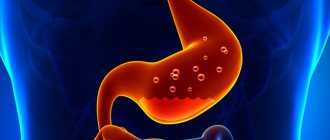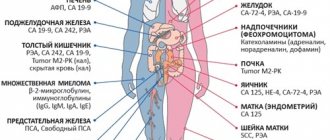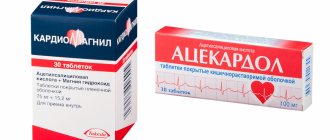Oncologist compulsory medical insurance
Ivanova
Marina Viktorovna
5 years experience
Oncologist (CHI)
Make an appointment
Gastric cancer is a malignant neoplasm that forms from the mucous epithelium and grows rapidly, spreading to other organs. The altered cells lose their original function, they only have the ability to divide uncontrollably, which leads to a rapid increase in tumor size. Metastases spread throughout the digestive tract, penetrate into the liver and lungs with the bloodstream, and into regional and distant lymph nodes with lymph.
Kinds
Up to 95% of all cases of the disease are adenocarcinomas. These tumors develop from mucosal cells that produce gastric juice. According to the histological classification of gastric cancer, there are four main types of adenocarcinomas:
- tubular - the most common mushroom-shaped neoplasms;
- papillary - characteristic of the upper part of the stomach, often metastasizing to the lymph nodes and liver;
- mucinous - mucous formations with tumor cells, accounting for about 10% of all cases of the disease;
- signet ring cells - consisting of cells with a displaced nucleus, which is why they resemble rings in shape.
About 5% of clinical cases are lymphomas, squamous cell, carcinoid and small cell tumors.
Classification and varieties
In terms of cellular structure, the overwhelming majority of gastric neoplasms are represented by adenocarcinoma, which is typical for the entire gastrointestinal tract. Morphological variants are possible in the form of papillary or tubular, mucinous or signet ring cell adenocarcinoma.
The choice of the optimal treatment method is based not so much on the cell variety as on the degree of its aggressiveness, that is, differentiation, where the minimum is designated as “highly differentiated.” High malignancy is inherent in the poorly differentiated form.
Invasive gastric carcinoma is not a separate disease, it is a natural process of tumor development, when it is no longer an isolated colony of cancer cells in a separate area of the mucous membrane, but penetrates into the surrounding tissues, destroying everything that interferes with its advancement in depth and breadth, and has acquired the ability to metastasize.
Symptoms
It is extremely difficult to identify the first signs of stomach cancer; the symptoms of the initial stages are often mistaken for manifestations of common gastrointestinal diseases:
- flatulence after eating;
- constant discomfort in the stomach;
- nausea with slight salivation;
- heartburn (if the tumor forms in the upper part of the stomach);
- loss of appetite and weight loss.
The listed symptoms of stomach cancer are accompanied by rapid fatigue, a constant feeling of tiredness, drowsiness, apathy, and poor health. As it grows, local signs appear, depending on the location of the tumor:
- in the upper part – difficulty swallowing food;
- in the middle section - constant salivation;
- in the lower part - a constant feeling of heaviness, belching with a putrid odor.
The patient suffers from severe abdominal pain; with gastric bleeding, vomiting “coffee grounds” is possible, i.e. dark mass, or mixed with scarlet blood.
Causes and risk factors
Currently, the main cause of stomach cancer is infection with the bacterium Helicobacter Pylori. This is the only microorganism that can survive and multiply in the acidic environment of constantly secreted gastric juice. The metabolic products of the bacteria irritate the gastric mucosa, which leads to atrophy of the glandular tissue, which degenerates into tissue resembling intestinal epithelium. If irritating factors are not eliminated, then dysplasia develops in the affected area - the cells become atypical, and in the future the process becomes malignant.
Gastroenterologists identify the following as negative factors that lead to the development of symptoms of stomach cancer:
- inherited predisposition to the development of gastric cancer;
- commitment to spicy foods, smoked meats, dried fish and meat, fatty and fried foods;
- long-term use of certain medications;
- excessive doses of radiation;
- smoking tobacco and regular alcohol consumption.
Men suffer from stomach cancer more often than women, and older people more often than young people.
Stages
The development of the oncological process begins with the zero stage of gastric cancer, at which dysplasia transforms into malignant cells. This stage is called cancer “in situ”, i.e. "on the spot." The neoplasm is extremely small in size and is discovered accidentally during an endoscopic examination for another disease. The process then develops in the following stages.
- Malignant cells spread throughout the mucous membrane, penetrate into the submucosal and sometimes into the muscular layer.
- The neoplasm penetrates all layers of the gastric wall, up to the outer membrane, and metastasizes to several regional lymph nodes.
- The tumor increases in size and affects up to 15 regional lymph nodes. Spread into neighboring organs is possible.
- The malignant process affects several vital organs - the heart, esophagus, lungs. Metastases penetrate to distant organs and lymph nodes.
Forecasts
For gastric carcinoma, the survival prognosis depends on the stage of tumor development. Patients whose treatment is started at the first stage recover in 95% of cases, at the second stage - in 56% of cases. Patients with stage 3 have a 5-year survival rate of 38%, but only 26% recover completely. With an advanced tumor, the prognosis is unfavorable: only 5% achieve five-year survival. However, the chances of recovery remain in any case: in clinics well equipped with modern equipment, the recovery statistics are significantly higher than average.
Diagnostics
Instrumental and laboratory diagnosis of stomach cancer includes the following studies.
- Gastroscopy. An endoscopic examination allows you to examine the internal surface of the organ and take a sample of pathological tissue for analysis.
- X-ray. It is performed with a contrast agent and allows you to identify changes in the relief of the mucous membrane, a decrease in the elasticity of the gastric wall and other changes.
- Ultrasound of the abdominal cavity. The study allows us to identify metastases to other organs.
- CT scan of the stomach. Shows how far the malignant process has spread.
- Blood test for tumor markers.
- Histological examination of a biopsy to determine the type of cancer cells.
Attention!
You can receive free medical care at JSC “Medicine” (clinic of Academician Roitberg) under the program of State guarantees of compulsory medical insurance (Compulsory health insurance) and high-tech medical care.
To find out more, please call +7, or you can read more details here...
Prevention and early diagnosis of gastrointestinal tumors
Screening. Cancer screening. Early diagnosis of cancer
Detection of cancer in the early stages provides an almost one hundred percent guarantee of recovery. The earlier cancer is detected, the more effective its treatment, and the cheaper it is. The Spizhenko Clinic has introduced the world practice of preventive examinations of the whole body - special screening programs “check up” and “oncocheck up”, developed in the clinic for different categories of the population.
Cancer screening is a preventive examination that includes laboratory tests and tests (including tumor markers), instrumental diagnostic methods (CT, MRI, ultrasound, mammography) and endoscopic examinations, which allows one to identify a person’s predisposition to the development of certain types of cancer and diagnose precancerous conditions and cancer at an early stage, as well as the presence of many non-cancer diseases.
Treatment
The choice of treatment regimen for stomach cancer depends on the stage of the disease.
- Surgery is the most effective method to completely restore the patient’s health. If cancer is detected “in situ”, laparoscopic sparing intervention is performed. Abdominal surgery with partial or complete removal of the stomach is performed at the first and second stages. At the same time, the affected lymph nodes are removed.
- Chemotherapy. Potent chemotherapy drugs are prescribed before surgery to reduce the size of the tumor or after - to destroy the remains of malignant cells and avoid relapse. At the inoperable stage, it becomes the main method of treatment. As a rule, several different drugs are combined to increase effectiveness.
- Radiation therapy. This method is also used before and after surgery, and for inoperable patients it is used to reduce tumors and prolong life. Radiation treatment is often combined with the use of chemotherapy.
- Targeted therapy. Selective drugs are prescribed to inoperable patients to block certain protein receptors and stop tumor growth. These drugs are suitable for approximately 20% of patients. They do not destroy tumor cells and are used as a palliative.
- Laparocentesis. The accumulated fluid is removed from the peritoneum through a small incision.
- Symptomatic therapy. Patients experiencing severe pain are prescribed painkillers according to a special regimen.
Radiation therapy
Radiation therapy for stomach cancer is usually combined with chemotherapy, this treatment is called chemoradiotherapy. Computed tomography helps select the type and dose of radiation and the number of procedures. Markers on the skin or special marks inserted into the tumor tissue help to correctly “target” the rays at the tumor area.
Usually the procedure lasts 10 minutes, 3 hours before it you cannot eat anything. There are the following modern types of radiation therapy for stomach cancer:
- 3D conformal radiation therapy is a method in which, thanks to volumetric planning, the shape of the irradiated volume maximally matches the shape of the tumor and practically does not affect healthy tissue;
- Intensity-modulated radiation therapy is used in cases where radiation affects vital organs: liver, lungs, heart. In this case, the general beam is divided into separate rays, which can have different intensities.
Diagnosis and treatment of stomach cancer in Moscow
If you need high-quality and accurate diagnosis when symptoms of stomach cancer appear, contact the Medicina clinic. For our patients:
- the most modern diagnostic medical equipment;
- well-equipped in-house laboratory;
- oncologists and gastroenterologists of the highest category;
- comfortable hospital rooms for the treatment of stomach cancer.
Call us to get detailed answers to all your questions.
Prevention
- A balanced diet with a predominance of fruits and vegetables.
- Quitting smoking and alcohol abuse.
- Modern treatment of stomach diseases - in particular Helicobacter Pilory - with subsequent medical supervision.
Regular preventive examinations and screening of people with a genetic and hereditary predisposition to the disease are also important. To consult with a specialized specialist in St. Petersburg, fill out the online form.
Sources:
- Asymptomatic course of stomach cancer. Shut.S.A., Platoshkin E.N., Dorogokupets A.Yu.: Problems of health and ecology, 2022.
- Combined treatment of stomach cancer. Afanasyev S.G., Tuzikov S.A., Davydov I.M.: Siberian Journal of Oncology, 2015.
- Surgical treatment of stomach cancer. Rakhov S.B.: Bulletin of the Kazakh National Medical University, 2012.
- Immunotherapy for gastric cancer. Mansorunov D.Zh., Alimov A.A., Apanovich N.V., Kuzevanova A.Yu., Bogush T.A., Stilidi I.S., Karpukhin A.V.: Russian Journal of Biotherapeutic, 2022.
The information in this article is provided for reference purposes and does not replace advice from a qualified professional. Don't self-medicate! At the first signs of illness, you should consult a doctor.
Questions and answers
How to recognize stomach cancer in the early stages?
In addition to the specific “stomach” signs of illness - flatulence, stomach discomfort, the patient develops inexplicable weakness and a sharp decrease in performance. One of the rather striking signs is an aversion to protein foods. If these symptoms appear, you need to undergo a gastroscopic examination without wasting time.
Is there a cure for stomach cancer?
The main danger of the disease is that the symptoms of stomach cancer in the early stages are often mistaken for a common disorder and people are in no hurry to consult a gastroenterologist. Even in countries with highly developed medicine, the disease is most often detected at the fourth, inoperable stage. Therefore, if warning signs appear, it is imperative to undergo a screening examination.
What kind of pain is felt with stomach cancer?
Pain sensations depend on the size of the tumor and its growth into other organs. The neoplasm grows slowly, from the moment the first malignant cells appear until the formation of a tumor measuring about 2 mm takes at least two, and more often about five years. All this time there are no symptoms of stomach cancer. Severe and constant pain appears already in the last, advanced stages of the disease.
Attention! You can cure this disease for free and receive medical care at JSC "Medicine" (clinic of Academician Roitberg) under the State Guarantees program of Compulsory Medical Insurance (Compulsory Medical Insurance) and High-Tech Medical Care. To find out more, please call +7(495) 775-73-60, or on the VMP page for compulsory medical insurance
Targeted therapy
Modern technologies have allowed scientists to learn more about the molecular genetic characteristics of malignant tumors, which has led to the emergence of targeted drugs. Unlike chemotherapy drugs, which attack all rapidly multiplying cells, each targeted drug has a specific target - a molecule that is necessary for the proliferation and survival of cancer cells.
For stomach cancer that has certain molecular genetic properties, two types of targeted drugs are used:
- VEGF blockers. Cancer cells produce large amounts of this substance to stimulate the growth of new blood vessels and receive more oxygen and nutrients. The group of VEGF blockers includes the drug ramicirum ;
- HER2 blockers. This is a receptor protein on the surface of cells, with increased activity of which cancer cells begin to multiply faster and behave more aggressively. A representative of HER2 blockers is the targeted drug trastuzumab .







